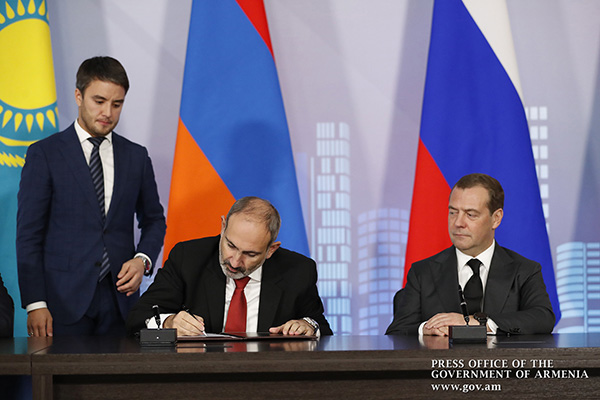Prime Minister Nikol Pashinyan arrived in the Russian Federation on a working visit. The Prime Minister attended a regular session of the Eurasian Intergovernmental Council in Moscow.
After the formal photo session, the Eurasian Intergovernmental Council met in narrow format, followed by an expanded-format meeting. In attendance were the Prime Ministers of Armenia, Russia, Kazakhstan, Belarus, and Kyrgyzstan. The meeting was also attended by Serbia’s Prime Minister of Serbia Ana Brnabić.
In his speech, Prime Minister Pashinyan, in particular, noted:
“Dear colleagues,
Dear guests,
I would like to begin with a vote of thanks addressed to Dmitry Anatolyevich for hosting today’s meeting, for hospitality and a traditionally warm welcome. I am pleased to visit Moscow once again and attend the meeting of the Intergovernmental Council.
Read also
Down to the agenda, I want to start with the report on the activities carried out by the Eurasian Economic Commission over the past period. I think that over its nearly four-year-long operations, the Eurasian Economic Commission has done a tremendous amount of work to implement in practice the principles of free movement of goods, services, capital, and labor. Remarkable results have been achieved in terms of creating and strengthening the institutions of the Eurasian Economic Union.
We can proudly state that our organization has taken a huge step forward on the way to international recognition of its place and role in the global economic system with a diversified portfolio of cooperation.
After proudly mentioning the results achieved so far, I would like to emphasize the need to improve the applicable regulatory framework, address the shortcomings and restrictions, coordinate policies in key sectors of the economy, as well as to alleviate the bureaucratic burden on business. We are faced with sizeable tasks in terms of deepening the cooperation between our countries in a wide range of industries.
One of these tasks is to develop a legal framework for the common market of alcoholic beverages. The final approval of the “Agreement on regulation of EAEU alcohol market,” which is based on the principles of non-discrimination and restriction of competition, will be another step towards removing the existing barriers. Creating conditions conducive to free circulation of precious metals, precious stones and products within the EAEU’s domestic market is another important task.
I believe that the signing of the relevant international agreement will provide mutually beneficial trade and economic mechanisms to enhance the Member States’ competitive advantages. The agreement will lift the restrictions associated with the lack of mutual recognition of assay marks.
In this context, the approval of the “Action plan for promoting EAEU-manufactured jewelry products in third country markets” will help increase competitiveness, boost our exports and will give a strong impetus to the development of that industry in our countries.
In the run-up to February, 2020, the formation of a new staff for the Board of the Eurasian Economic Commission is becoming increasingly relevant. We believe that the introduction of a rotation mechanism can lay the foundation for a fair redistribution of functionality based on the principles of equality and mutual respect for each other’s interests.
Dear Friends,
As I have repeatedly stated, a key priority for Armenia’s EAEU chairmanship in 2019 is the diversification of foreign economic relations and the expansion of free trade agreements’ geographical coverage.
In this respect, I wish to felicitate all of us on the signing of another free trade agreement. I would like to note with great pleasure that today we will sign one with Serbia. Armenia intends to take full advantage of the mechanisms available under this arrangement.
Another landmark event on the way to implementing the goals and objectives set for the Union’s international activities is the entry into force of the Agreement on Trade and Economic Cooperation between the Eurasian Economic Union and its Member States, on the one hand, and the People’s Republic of China, on the other.
Despite the fact that the Agreement does not provide for the removal of duties or automatic reduction of non-tariff barriers as it is non-preferential in nature, yet it will facilitate access to the PRC market for goods produced in EAEU countries by simplifying trade procedures, increasing transparency and the level of interaction in all areas of trade cooperation.
In conclusion, I want to note that today’s meeting is the last meeting of the Intergovernmental Council that I am attending as the chairperson. In this regard, I wish to thank everyone for cooperation and support. Taking this opportunity, I also want to wish Belarus Prime Minister Sergey Nikolayevich Rumas successful chairmanship in the Intergovernmental Council. Thank you.”
Issues related to national regulatory acts in the field of trade in alcoholic products and the expansion of cooperation between Member States in a number of spheres, including precious metals, industry and agriculture, were discussed during the meeting. In connection with the expiration of the term of office of the Board of the Eurasian Economic Commission on February 1, 2020, a report was delivered on the key results of EAEC-implemented activities.
In the context of developing EAEU’s international activities, the Prime Ministers of EAEU-Member States and Prime Minister of Serbia Ana Brnabić signed a free trade agreement between the EAEU and Serbia. A joint statement was adopted on the occasion of the entry into force of the Trade and Economic Cooperation Agreement between the Eurasian Economic Union and its Member States, on the one hand, and the People’s Republic of China, on the other.
INFORMATION AND PUBLIC RELATIONS DEPARTMENT OF THE OFFICE OF THE PRIME-MINISTER OF THE REPUBLIC OF ARMENIA



















































